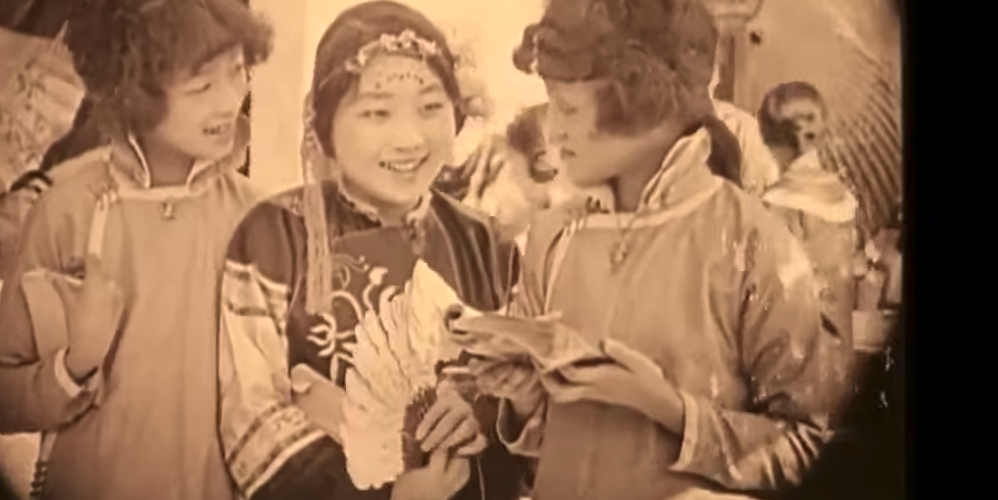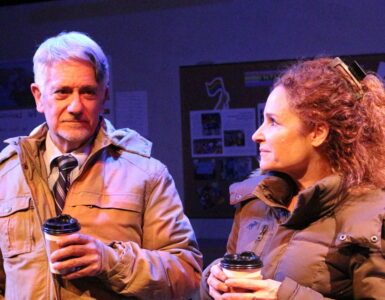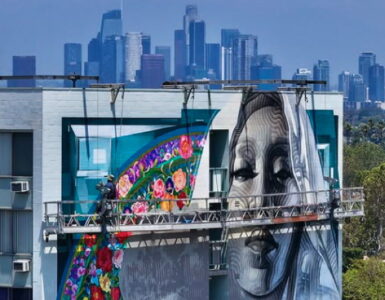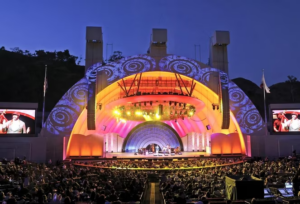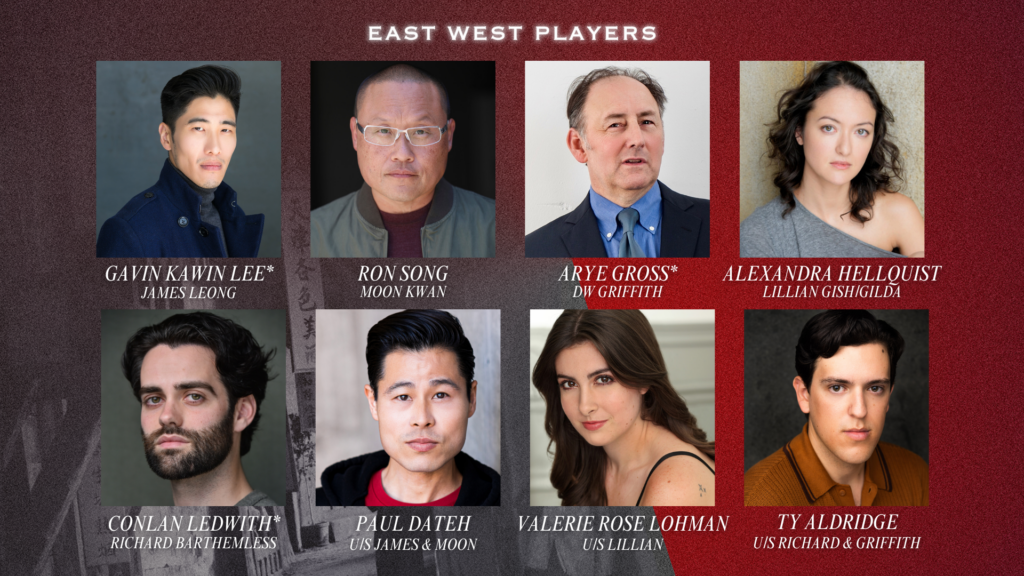
In D.W. Griffith’s 1919 feature film Broken Blossoms, a young girl, Lucy Burrows, is abused by her alcoholic prizefighting father, Battling Burrows. She meets Cheng Huan, a kind-hearted Chinese man who falls in love with her. As Cheng nurses Lucy back to health, the two form a bond as unwanted outcasts of society.
The new play Unbroken Blossoms by Philip W. Chung is the story of the silenced voices behind this real silent film Broken Blossoms. Chung’s play is a historical reimagining of the making of the boundary-breaking Hollywood classic that shines a light on the collateral damage in the search for “authentic” representation, and asks what price we pay for our art.
From the press release:
The year is 1919 – and Hollywood’s first onscreen interracial love story is about to go before the cameras – between a white actress and a white actor in yellowface makeup. The movie in question is Broken Blossoms, the director is the notorious D.W. Griffith, and the lovers are being played by Lillian Gish and Richard Barthelmess, in the roles of “Lucy Burrows” and “Cheng Huan.”
This is the subject of East West Players next World Premiere play, Unbroken Blossoms by Philip W. Chung (KCET/Artbound’s East West Players: A Home on Stage) and directed by Jeff Liu (EWP’s The Brothers Paranormal & Chinglish), a historical reimagining of the making of this actual boundary-breaking Hollywood classic.
In Unbroken Blossoms, Moon, an idealistic family man, and James, a cynical, aspiring filmmaker, are hired as the Chinese American consultants for Broken Blossoms, and must contend with the outsized ego of the film’s director D.W. Griffith, who is attempting to belie criticisms of racism after the recent release of his controversial film The Birth of a Nation.
Based on actual events, this story of the silenced voices behind the real silent film Broken Blossoms illuminates a historical conflict just behind the silver screen.
ArtsBeatLA spoke with playwright Philip W. Chung in advance of the world premier of his play at East West Players. Unbroken Blossoms continues East West Players 2024 season from June 27 through July 21, 2024 at the David Henry Hwang Theatre in Downtown LA.
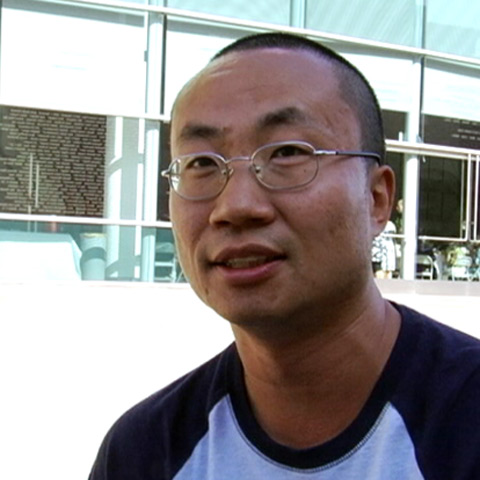
What was the impetus to tell this story, to write this play?
Philip W. Chung – As an Asian American working in film and theater, I’ve often been critical of how Asians and other marginalized communities have been negatively portrayed in our media. And I’ve just as often received pushback from people who make the argument that “it’s only a movie” – that the images we see in the media don’t have any harmful influence on our lives. But I believe the best counter-argument to this view is found in the film that many consider the first crowning cinematic achievement: director D.W. Griffith’s 1915 silent epic, The Birth of a Nation.
While The Birth of a Nation did advance the craft of filmmaking in unprecedented ways and, arguably, helped turn film into a true art, it was also a work that was aggressively anti-Black that painted the Ku Klux Klan as America’s saviors. The KKK had all but disappeared by 1915, but Griffith’s movie was so successful that it inspired a massive re-launch of the group and, over a hundred years later, we’re still feeling the effects of that moment. I can’t think of a better argument for how the “reel” world has a direct impact on our “real” world.
I wanted to explore this relationship between the “reel” and the “real”. I’ve also always been interested in Hollywood history and I had recently watched Arthur Dong’s great documentary Hollywood Chinese where I learned that Griffith had employed two Chinese American consultants on his 1919 film, Broken Blossoms. Broken Blossoms tells an interracial love story between a white woman and a Chinese man, but of course the Asian character is played by a white actor in yellow face – a historically common practice in Hollywood. The story of the making of Broken Blossoms from the pov of those two consultants seemed like the perfect way to explore my various interests.
Broken Blossoms is notable for its portrayal of interracial romance, but it has also been criticized for perpetuating racial stereotypes and exoticizing Asian characters.
Why did D. W. Griffith feature miscegenation in his movie Broken Blossoms? Is he sympathetic to race relations or is he seeking to exploit a controversial topic?
Broken Blossoms does exoticize its Chinese character. It does feature “yellow face” with a white actor made up to look Asian. But in defense of the film, I do think it was progressive in its own way for 1919. This was a time of anti-Asian sentiment and legislation like the Chinese Exclusion Act, which limited immigration from China. So while the Asian man in the film comes off as a stereotype, he’s still presented as a more nuanced, sympathetic figure.
We know that Griffith was surprised and disturbed by the accusations of racism that followed the release of The Birth of a Nation. While he never apologized for making that movie, I don’t think it’s an accident that a number of the films he produced afterwards, including Broken Blossoms, made more of an argument for tolerance. Though he denied being a racist, I also don’t think he was necessarily sympathetic to race relations. If anything, my interpretation of Griffith in the play is that he was driven by more of a personal, selfish motive. I think making a film like Broken Blossoms was, at least partially, a way to control his self-image and help advance the argument that he wasn’t a bigot.
How does your play focus on the behind-the-scenes making of Broken Blossoms? Will we see the Chinese American consultants butting heads with Griffith and the film industry censors?
As an Asian American, I still find myself often “code switching” depending on who I’m interacting with. So I’m fascinated by what the version of code switching must have been like in 1919. While the two consultants in my story, James B. Leong and Moon Kwan, have strong and, often, differing opinions about their roles on the production, they still have to navigate the reality of being Chinese in 1919.
How they behave when they are spending time alone with each other in the play is very different than when they are in the presence of Griffith or a white movie star like Richard Barthelmess, whom they are tasked with turning into a believable Chinese man. There’s a lot of fun we have in the play with their code switching, which I hope the audience will find entertaining and humorous, but the very real dramatic consequences of what happens when you step out of line as an Asian is also something we explore. I can’t say enough about how our talented cast really makes those moments memorable and surprising.
The press notes mention that your play “shines a light on the silenced voices behind a real silent film” – how does it do that?
Although my play is historical fiction, James B. Leong and Moon Kwan were not only real people, but filmmakers themselves. It still blows my mind that there were Asian Americans like them working in Hollywood back then. In fact, Leong produced and directed his own feature film, Lotus Blossom, just a few years later in 1921.
This notion of “shining a light on the silenced voices” is another major reason why I wanted to write this play. Even as someone who has been steeped in Hollywood film history as I was, I had never heard of Leong and Kwan until Arthur Dong’s documentary. As one of my characters says in the play, there’s really no historical record of what they did on the production or that they were even really there.
Even though my versions of Leong and Kwan are fictionalized, I hope the play inspires audiences to seek out more information about them and, in turn, that leads them further down the rabbit hole to learn about their other filmmaking contemporaries. Artists like Marion E. Wong, the first Asian American to produce and direct a feature film in 1916, or Sessue Hayakawa, the first Asian movie star who started his own studio in 1918. And there’s so many others like Anna May Wong, Oscar Micheaux, Lois Weber – they weren’t white men so they may not be remembered as much as someone like Griffith is today, but they were as important to the history of cinema in their own right.
Is there anything else audiences can expect from this world premier?
When I started writing this play almost a decade ago, I have to admit the world of 1919 felt very distant and more like a faraway relic. 1919 was a year that saw the Spanish Flu global pandemic, violent Black-White race riots all over America dubbed the Red Summer, war in Europe, anti-Asian sentiment, and a Hollywood on the verge of collapse – all these events are present in my play. But who could have predicted what would happen to our world post-2020 and that my play would suddenly feel modern and relevant in a way that I could not have imagined in a million years? So through no planning or insight of my own, Unbroken Blossoms feels more like a contemporary play than it did when I started work on it. And while, sadly, that says something about how far we haven’t come as a society in the past hundred years, I hope it also moves audiences to reflect on the progress we have made and find inspiration in the lives of our pioneers to continue moving forward.
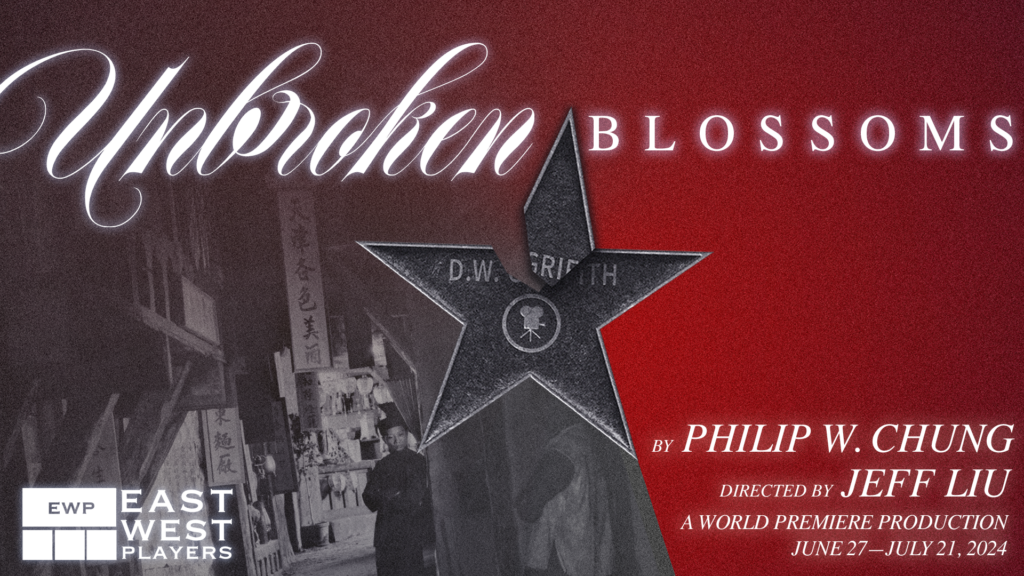
Tickets to Unbroken Blossoms may be purchased online at eastwestplayers.org or by calling (213) 625-7000. At time of purchase please mention any wheelchair/accessible seating needs. Student, senior, and group discounts are available. Box office is available 11AM – 5PM, Monday-Friday, as well as ninety minutes before all performances.
All performances of Unbroken Blossoms will be presented at the David Henry Hwang Theater in the Union Center of the Arts at 120 Judge John Aiso Street, Los Angeles, CA 90012 in Little Tokyo.
Unbroken Blossoms will perform June 27 through July 21, 2024 with opening night on Sunday, June 30th, 2024. Performance times Thursdays, Fridays, Saturdays, and Mondays are at 8PM, with additional 2PM matinees on Saturday and 5PM performances on Sunday.
All Saturday 2PM performances are Masked Matinees, making theater more accessible to audiences who prefer a masked audience experience.
Ticket prices range from $39.00 to $69.00 A Pay-What-You-Can performance is scheduled for Monday, July 8th at 8PM. EWP offers $15 Access Tickets in limited quantity to all performances. Access Tickets are intended to lower the price barrier to access live theater by offering a more affordable option to EWP mainstage performances. Access Tickets are available via the same methods all tickets are purchased, with no additional steps necessary to purchase. Performance dates and details are subject to change.
Unbroken Blossoms was originally presented in 2015 by Visual Communications in partnership with East West Players, and was also a semi-finalist for the Eugene O’Neill Theater Center’s National Playwrights Conference.
Unbroken Blossoms playwright Philip W. Chung was a Co-Artistic Director and Co-Founder of Lodestone Theatre Ensemble, as well as the consulting producer of the 2023 KCET/Artbound documentary, East West Players: A Home on Stage, currently available for streaming at eastwestplayers.org/artbound. Philip W. Chung and Unbroken Blossoms director Jeff Liu have collaborated in the past, on a hybrid theater-film-streaming production of the play Yellow Face by David Henry Hwang for the YOMYOMF Network on YouTube.
The cast of Unbroken Blossoms includes Gavin Kawin Lee (LATC & EWP’s Tacos La Brooklyn, EWP & The Fountain Theatre’s Hannah and the Dread Gazebo) as James Leong, Ron Song (Amazon’s Jury Duty) as Moon Kwan, Arye Gross (EWP’s M. Butterfly, AMC’s Better Call Saul) as D.W. Griffith, Alexandra Hellquist (Rogue Machine Theatre’s On The Other Hand, We’re Happy) as Lillian Gish/Gilda, and Conlan Ledwith (Antaeus Theatre Company’s The Winter’s Tale) as Richard Barthelmess.
Artist Biographies
Philip W. Chung (Playwright) is a writer and producer based in Los Angeles. He was the co-founder/co-Artistic Director for Lodestone Theatre Ensemble, an acclaimed Asian American theater company, where he wrote/produced/directed almost 100 mainstage productions, workshops, readings, and other theatrical events. He was the creative director at YOMYOMF, founded by the Fast & Furious franchise director Justin Lin to tell stories from Asian American and other underrepresented voices. At YOMYOMF, Chung oversaw the hybrid production of David Henry Hwang’s Pulitzer Prize-finalist play, Yellow Face, which was adapted by Unbroken Blossoms director Jeff Liu (and is available to watch on YouTube). Unbroken Blossoms was a semi-finalist for the Eugene O’Neill Theater Center’s National Playwrights Conference and a scripted podcast series version of the story is in development with Clamor Media and YOMYOMF. Previously, Chung has developed/produced projects for Comcast/NBCUniversal, Legendary Pictures, eOne, IFC Channel, Gunpowder & Sky, Google/YouTube, HBO Max/WB, and others. He was the consulting producer on the 2023 KCET/Artbound documentary, East West Players: A Home on Stage (available on YouTube and the PBS app), and recently sold or optioned his screenplays to Netflix and Buzzfeed Studios. He is consulting producer on an upcoming Margaret Cho-narrated documentary about the Asian American hapa cult icon Tura Satana (star of Russ Meyers’ Faster Pussycat! Kill! Kill!) and associate producer of the indie film Late Bloomers, which premiered at SXSW and stars Jumanji’s Karen Gillan (coming June 7). His play My Man Kono, a historical drama about Charlie Chaplin’s Japanese American valet, will world premiere Off-Broadway at the Pan Asian Rep in early 2025 (the play placed second in EWP’s Pacific Century Playwriting competition). He was also commissioned by the Adventure Theatre MTC in Washington, DC to write the book and lyrics for POOP! The Musical in collaboration with composer Woody Pak (Making Tracks).
Jeff Liu (Director) is a writer and director for theater, film, and web, and also an Artistic Producer for the Ojai Playwrights Conference. His productions include the LA premiere of Chinglish by David Henry Hwang (LA Times Critic’s Choice), as well as the world premieres of Warrior Sister of Wu by Damon Chua, Memorial by Livian Yeh (NYT Critic’s Pick), Paletas de Coco by Franky D. Gonzalez (Ars Nova ANTFest), The Brothers Paranormal by Prince Gomolvilas, Two Mile Hollow by Leah Nanako Winkler, Mexican Day and The Chinese Massacre (Annotated) by Tom Jacobson, Texas and Solve For X by Judy Soo Hoo, Murderobilia and Terminus Americana (Ovation Award nominee for Best World Premiere) by Matt Pelfrey, and The Golden Hour and Grace Kim and the Spiders From Mars by Philip W. Chung. He also adapted and directed the Pulitzer-nominated play Yellow Face by David Henry Hwang for the YOMYOMF Network on YouTube, where it is still available to watch for free.


